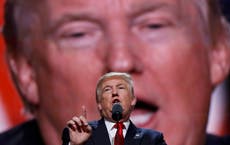Pompeo reverses Obama-era ruling and designates products made in West Bank communities as ‘Made in Israel’
Changing the labelling was ‘consistent with our reality-based foreign policy approach,’ secretary of state says
Secretary of Mike Pompeo has reversed an Obama administration ruling and designated that imports from West Bank settlements should be labelled as “Made in Israel”.
Changing the labelling was “consistent with our reality-based foreign policy approach” and would “eliminate confusion by recognising that producers in other parts of the West Bank are for all practical purposes administratively separate and that their goods should be marked accordingly,” the State Department said.
In 2016, the Obama administration reestablished a 1995 policy that required products produced in Judea and Samaria, called the West Bank by the Israeli government but considered occupied territory by many countries, to be labelled “Made in the West Bank”.
EU guidelines state that farm and other products made in Israeli settlements and exported to member countries should be clearly labelled as coming from the settlements, which the bloc considers illegal under international law.
Prior to Mr Pompeo’s trip to Israel, four Republican senators – Tom Cotton of Arkansas, Marco Rubio of Florida, Ted Cruz of Texas, and Kelly Loeffler of Georgia – released a 16 November statement calling for products produced in the West Bank to be labelled as “Made in Israel".
“We appreciate your leadership and many achievements in support of Israel, our closest ally in the Middle East,” the senators wrote.
“Unfortunately, the United Nations and some prominent members of the Democratic Party are working to oppose Israel and to support the antisemitic Boycott, Divestment and Sanctions (BDS) movement, which seeks to isolate and damage Israel economically.”
All previous US presidents since 1967 have considered the West Bank and Golan Heights as occupied territory instead of part of Israel.
The Trump administration has become the first since then to take steps to legitimise the territory as part of Israel, including moving the US Embassy from Tel Aviv to Jerusalem, which Israel claims as its capital. The move, which reversed decades of US policy, was widely criticised and led to a series of deadly protests by Palestinians.
Mr Pompeo also visited a winery in the Psagot settlement in the West Bank, the first visit to an Israeli West Bank settlement by a top US diplomat.
The incoming Biden administration will face its own struggles amid the Israeli-Palestinian conflict due to the decisions President Donald Trump made during his presidency, especially if the president-elect wants to prioritise a two-state solution.
Mr Biden will likely keep the US Embassy in Jerusalem, but might also find ways to acknowledge Palestinians and their aspirations to having the capital of their own state in East Jerusalem.
The president-elect has also indicated he might oppose settlement expansions, which were deemed not inherently illegal by the Trump administration. Traditional US policy has designated settlements as obstacles to peace between Israel and the Palestinians.
But the Trump administration’s pro-Israel legacy within the West Bank will likely hold in some areas, impacting the decisions Mr Biden makes in working to establish peace between the two states.
Subscribe to Independent Premium to bookmark this article
Want to bookmark your favourite articles and stories to read or reference later? Start your Independent Premium subscription today.




Join our commenting forum
Join thought-provoking conversations, follow other Independent readers and see their replies
Comments